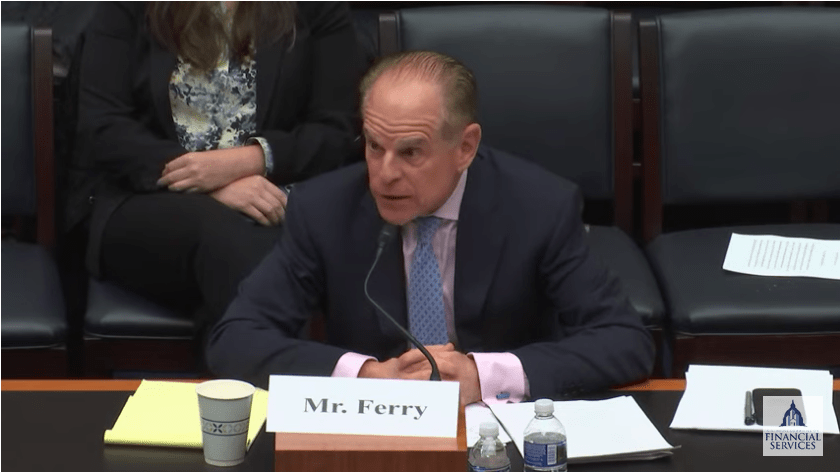“U.S. investors are inadvertently subsidizing Chinese companies involved in activities that are contrary to the national security, economic security, and foreign policy interests of the United States. We are also subsidizing the economic growth of the United States’ top global adversary.” — CPA Chief Economist Jeff Ferry
WASHINGTON — Jeff Ferry, Chief Economist for the Coalition for a Prosperous America (CPA), delivered testimony this week in front of the House Committee on Financial Services Subcommittee on Investor Protection, Entrepreneurship and Capital Markets. The hearing, titled “Investing in our Rivals: Examining U.S. Capital Flows to Foreign Rivals and Adversaries Around the World,” looked at the risks posed to American investors by nations that are adversarial and hostile to U.S. interests—most notably Russia and the People’s Republic of China (PRC).
“For American investors, there is no greater exposure to any rival than the People’s Republic of China (PRC) led by the Chinese Communist Party (CCP),” Ferry testified. “In 2020, U.S. holdings of Chinese securities neared $1.2 trillion. This is about five times the holdings than that of any other country. The exposure of U.S. investments in Chinese securities has never been greater, and it will continue to grow.”
Ferry’s testimony focused on the problem of U.S. investor exposure to Chinese securities, the risks this poses to U.S. economic and national security and potential solutions that should be considered. In particular, Ferry called on Congress to address the bulk of “bad actor” Chinese companies that are still present in American passive investment products.
“Their presence is in the form of over 4,200 A-share and H-share companies found throughout a multitude of financial vehicles, such as Exchange Traded Funds (ETFs) and index mutual funds, that have received little or no regulatory scrutiny or fiduciary due diligence,” Ferry testified. “Tens of millions of Americans are unwittingly exposed to these A-shares in their investment portfolios and retirement investment accounts. U.S. investors are inadvertently subsidizing Chinese companies involved in activities that are contrary to the national security, economic security, and foreign policy interests of the United States. We are also subsidizing the economic growth of the United States’ top global adversary.”
In August, CPA released its findings regarding the Thrift Savings Plan’s (TSP) new Mutual Fund Window. As first reported by The Wall Street Journal, CPA’s deep-dive into the Mutual Fund Window’s offerings document serious exposure to companies owned or controlled by the Chinese Communist Party (CCP). Shockingly, the FRTIB admitted publicly that it has not conducted any due diligence to evaluate whether these mutual funds include Chinese-owned entities that pose national security risks or fund Chinese companies engaged in human rights violations.
CPA’s research also found that five of the largest international funds in the Window had an average weight of 22 percent toward Chinese companies, and all five funds held companies listed on the U.S. Department of Treasury’s list of Chinese Military-Industrial Companies, the Department of Commerce Entity List, the Commerce Department’s Unverified list, or the Department of Defense Chinese Military Companies list. Companies are placed on these lists because they threaten U.S. national interests, have been involved in serious technology theft, and/or are implicated in the genocide of the Uyghur people.
CCP-owned companies found in the funds include the Aviation Industry Corporation of China (AVIC), China General Nuclear Power Group (CGN), and COSCO Shipping. The funds also included companies under scrutiny for forced labor practices, as well as those involved in China’s growing surveillance technology state.
In an exchange during the hearing, Representative Jim Himes (D-CT) asked Ferry about the U.S. economy’s entanglement with the Chinese economy, and whether the U.S. should pursue more free trade agreements.
Rep. Jim Himes (D-CA): What should be our strategy with respect to these financial and capital markets entanglements with China? Should we be looking for less because of what that might imply for growth? Or should we be looking for more because commercial entanglement with them might actually create interests that go against the possibility of kinetic antagonism?
Ferry: Congressman, I believe we are to decouple this economy from China, not immediately, but over time. I believe that will benefit the U.S. economy. You say there are commercial gains on both sides. Well, right now we are importing from China $600 billion worth of goods each year, and exporting around $150 billion worth of goods. If we can reduce that level of imports and redirect that demand towards American production, you will see the American economy grow, you will see employment, good paying jobs grow in this country.
On the capital markets side, I think the same thing will follow. We do not need them to buy $1 trillion worth of our Treasury debt. And they are buying it partly in order to keep the dollar high so that they can continue to keep Chinese people employed because the one thing President Xi fears more than anything else, is a revolution of the Chinese people against the oppressive system he has put in place. Instead, our capital should be funding investments in U.S. industry and investing in friendly nations.
As far as capital markets go, I always fall back on the quote of Paul Volcker, who was chairman of the Fed many years ago, and I believe the best Chairman the Federal Reserve ever had. He said, “Every time I have a meeting with financial professionals, they tell me that free, open capital markets are making the U.S. economy more efficient. And I asked them for an example. And in 30 years, they’ve never been able to give me one.”
Himes: Should Congress reopen talks about the Trans-Pacific Partnership trade agreement?
Ferry: No. Free trade agreements will not benefit us in this endeavor and are not helpful to the U.S. overall.
Read Ferry’s full testimony here and watch the full hearing here.













